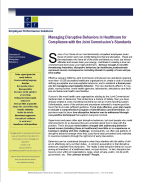Managing Disruptive Behavior in Healthcare Workshop
In July 2008, a Sentinel Event Alert was issued by The Joint Commission on Behaviors that Undermine a Culture of Safety. The JC has found that intimidating and disruptive behaviors in healthcare environments can:
- Foster medical errors.
- Contribute to poor patient satisfaction and preventable adverse outcomes.
- Increase the cost of healthcare.
- Cause qualified clinicians, administrators and managers to seek new positions in more professional environments.
The Challenge
Behaviors can be considered disruptive when they interfere with the ability of others to effectively carry out their duties. The common assumption is that disruptive behaviors originate from physicians. The reality is that disruptive behavior occurs among all members of a healthcare team, not just doctors.
Disruptive behaviors, such as reluctance or refusal to answer questions, return phone calls or pages; condescending language or voice intonation; and impatience with questions, are often hard to isolate, difficult to prove and uncomfortable to address. Overt and passive behaviors undermine team effectiveness, can compromise the safety of patients and impact quality of care.
A New Approach
The underlying problem is the inability to translate performance issues into effective words that are comfortable to say and will positively affect the employee. The Performance Continuum Feedback Method® (PCFM) bypasses the need to raise negative performance examples, thus alleviating defensive reactions through non-threatening conversations. Managers and employees come to terms with developmental solutions and goals faster.
Session Takeaways
- Learn how to provide informal and formal feedback on one-time incidents and ongoing patterns of disruptive behavior.
- Gain awareness and avoid
- New and simple approaches to communicate performance feedback that has a greater chance for a receptive employee response versus a defensive reaction.
- A manageable action plan for diagnosing performance issues based on behavior-based issues, crafting performance messages that are honest, non-critical and constructive, and managing the resulting discussion to alleviate awkwardness and defensiveness.
- Creation of at least one actual performance message.
Tools Attendees Will Take Away
- Templates, tools and job aids, which can all be customized based on your organization’s performance management philosophy, process and supporting forms.
- Materials will be provided in the form of participant workbooks with reproducible tools in soft copy, with the right to reproduce the tools for use back on the job.
Who Should Attend?
Healthcare employees who are responsible for providing feedback to peers, supervisors, managers, team leaders and HR professionals.
Contact Employee Performance Solutions for more information or to schedule a Managing Disruptive Behaviors in Healthcare Workshop for your organization.
Related Resources and Blog Posts:
- Behaviors that undermine a culture of safety, Sentinel Event Alert 40
- Quantifying the Effects of Bad Behavior at Work
- How to Manage Disruptive Behaviors Paper-Address Disruptive Employee Behaviors Offer


